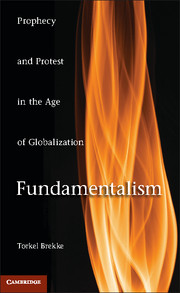Book contents
- Frontmatter
- Contents
- Acknowledgments
- Introduction
- Part I The Historical and Ideological Context of Fundamentalism
- Part II Fundamentalist Struggles
- 5 The Struggle for the State
- 6 The Struggle over Law
- 7 The Struggle for the Sciences
- 8 The Struggle over Education
- 9 The Struggle over Women
- Conclusion
- Bibliography
- Index
- References
7 - The Struggle for the Sciences
from Part II - Fundamentalist Struggles
Published online by Cambridge University Press: 05 June 2012
- Frontmatter
- Contents
- Acknowledgments
- Introduction
- Part I The Historical and Ideological Context of Fundamentalism
- Part II Fundamentalist Struggles
- 5 The Struggle for the State
- 6 The Struggle over Law
- 7 The Struggle for the Sciences
- 8 The Struggle over Education
- 9 The Struggle over Women
- Conclusion
- Bibliography
- Index
- References
Summary
Historian Paul Johnson begins a popular book about modern times by stating that the modern world began on May 29, 1919. On that day, scientists were able to confirm Albert Einstein’s general theory of relativity by close observations of a solar eclipse, and, as a consequence, the classical Newtonian worldview had to be modified. Johnson fittingly calls his first chapter “A Relativistic World.” Johnson’s statement is a way of saying the obvious: that there is no simple way of dating modern times that everybody would agree to, so one might as well choose a date that fits one’s purpose. Relativism is indeed one of the aspects of the modern worldview that fundamentalists everywhere react against, but for some reason Einstein’s mathematical calculations have not attracted much attention from fundamentalists. I have never heard of a fundamentalist challenging the famous equation E=mc2. This is simply because the relativity of physics has little to do with the status of revealed religious truths. The relativity that hurts for many fundamentalists is the one that questions the status of sacred scripture and its contents.
Modern biology’s view of human evolution has been a major issue of conflict between conservative and liberal Christians in Europe and America since Charles Darwin’s work On the Origin of Species by Means of Natural Selection was published in 1859. Today, the conflict between fundamentalist Christians and secularist scientists is getting hotter in several countries, and there is reason to expect that human evolution will become even more of a contentious subject in the future in Muslim societies, as we shall see. Thus, it is difficult to agree with the authors of the book Strong Religion when they expect that the less triumphal demeanor of contemporary science will take the wind out of the sails of fundamentalism. On the contrary, the conflict between biological science and religion is rather likely to get hotter.
- Type
- Chapter
- Information
- FundamentalismProphecy and Protest in an Age of Globalization, pp. 177 - 211Publisher: Cambridge University PressPrint publication year: 2011



